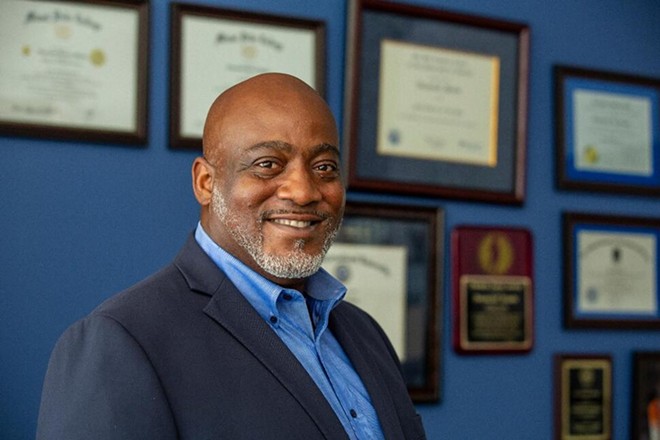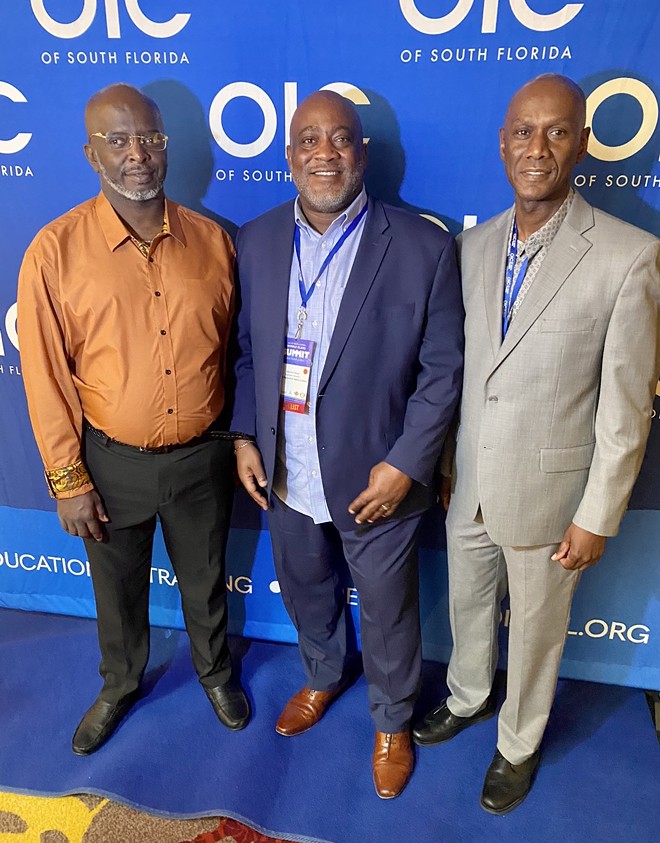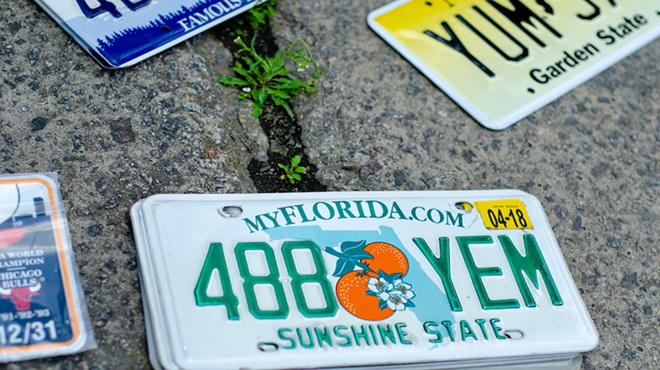
Millions of people in the United States each year leave jail or prison to return to their communities. They often face barriers to successful re-entry.
One of those challenges, directly tied to having a record, is finding gainful employment. People who are justice-impacted — that is, they have a criminal record or a history of incarceration — have a significantly harder time getting a steady, good job compared to the general population. And without that kind of opportunity to reintegrate and rebuild their lives, people are more likely to reoffend and get caught up again in the unforgiving cycle of the justice system.
Reform activists in Florida like Desmond Meade, president of the Florida Rights Restoration Coalition and a returning citizen himself, have seen this play out in communities.
Before becoming a nationally renowned criminal justice and voting rights activist, Meade, 57, struggled with drug misuse, thoughts of suicide and homelessness. He came from a working-class family, grew up in Miami, and later joined the U.S. Army. While stationed in Hawaii, a friend introduced him to cocaine, and he fell into a downward spiral from there. With the right help, however, he was able to overcome these obstacles in his own life, following multiple stints in jail and then prison.
It was a process. It took time. He went to college, graduated with honors, studied law, and eventually became an advocate for others with a record.
And that continues today. On Thursday, the Florida Rights Restoration Coalition kicked off its new campaign, dubbed “Let My People Work.” Meade said the campaign aims to raise awareness of the barriers that formerly incarcerated people face in securing a job — and advance reform efforts to break them down.
As someone who has worked with politicians on both sides of the aisle in Florida to reach bipartisan consensus on these issues, he said the goal is to advance toward a Florida that is brighter and more prosperous for everyone, not just those directly affected by incarceration.
“If we, as returning citizens, cannot get great jobs or earning opportunities, right, we can’t pay our fair share of taxes,” Meade explained to Orlando Weekly, during a phone call after the campaign's launch in South Florida. “If we're facing barriers to housing, we can't contribute to the local economy.”
Lacking job opportunities for returning citizens, he said, isn’t just a problem for them and their own families. “It’s the entire state. Communities are losing out.”
To explain, Meade pointed to data on recidivism and its costs. According to the nonprofit Prison to Employment Connection, formerly imprisoned people who maintain employment for one year after their release are more than three times less likely to reoffend compared to those who don’t manage to find or keep a job. And reincarcerating people — locking them up, instead of giving them the resources they need to prosper — isn't cheap.
A 2023 report from the Florida Policy Institute found that out of the 29,242 people who were released by the Florida Department of Corrections in the 2018-2019 fiscal year, 22 percent returned to prison within three years. The estimated cost to the state for this? One hundred and eighty-five million dollars.
“The Let My People Work campaign, you know, it gives us opportunity to shed light just not only on the returning citizen and the challenges that they face to reentry,” Meade told Orlando Weekly, “but also to shed light on ourselves and our communities, and shed light on potential that we have to actually be major contributes to Florida's economy.”

Advocating for more gainful job opportunities for folks with a record might also benefit those in the system who struggle with the more invisible monsters: addiction, the psychological toll of incarceration and a lack of opportunity to help them find a way forward on the outside.
Dr. Thomas Hall, a local substance use treatment provider and director of Orange County's Office for a Drug-Free Community, told Orlando Weekly earlier this year that people recently released from the Orange County jail make up a shocking 1 in 5 drug overdose deaths that occur in the county. In 2023, more than 400 people in Orange County lost their lives to overdose, with most involving illicit forms of the synthetic opioid fentanyl. The county has launched efforts to help this population, but it's a work in progress.
Lack of healthcare, decreased drug tolerance and social stigma all can contribute to a formerly incarcerated person's risk for overdose, if they have a history of drug misuse and they return to old habits on the outside. But so can unemployment, or a lack of social welfare programs to help job seekers find steady work and safe housing after lockup.
Florida prison reform efforts
Florida law doesn't make it easy. While the DeSantis administration is perfectly fine sending unpaid incarcerated workers to clean up hurricane damage, state law maintains literally hundreds of restrictions on job licensing and employment opportunities for workers with a criminal record. Some are specific to certain offenses, others broadly apply to felony convictions.
Reducing or getting rid of some of these barriers is one of the top reform efforts that the Florida Rights Restoration Coalition, along with other reform advocates across the political spectrum, has been pushing to advance. The group estimates that job licensing restrictions for those with a criminal record cost Florida $11.6 billion per year and over 129,000 jobs, at a time when business lobbying groups are pitching child labor reforms to address labor shortages.
The Institute for Justice, a libertarian think tank, ranked the Sunshine State as the fifth “most burdensome” in the country in 2022 for its occupational licensing laws, which affect workers — disproportionately those with felony convictions — in a wide range of industries.
Earlier this year, Florida lawmakers actually sought to address this, in an atypical bipartisan fashion. The state Legislature approved HB 133, legislation that sought to, at the very least, make it a bit easier for job seekers with criminal records to apply for a barber or cosmetologist license. Supporters, including the FRRC, saw it as a common-sense strategy to help break down barriers for people who are trying to successfully reintegrate into society, make a living and contribute to their communities.
The bill earned unanimous support from a GOP-dominated state Legislature that rarely agrees on anything of substance these days. Despite the show of support, however, it was ultimately vetoed by Gov. DeSantis, and thus scrapped. Also vetoed was another bill that aimed to help remove barriers to higher education for incarcerated people, by preventing a person's incarceration from affecting their residency status for tuition purposes.
DeSantis, in his veto message, framed it as an effort to “reward criminal activity.”
Meade, however, called bullshit (our term, not his). “To get Democrats and Republicans to agree on something like this is nothing short of a miracle,” he told Orlando Weekly. “It wasn't about rewarding anyone, right? It was actually about creating opportunities for the state of Florida to thrive even more economically.”
According to the Vera Institute, incarcerated people who participate in a college or university program are 48 percent less likely to return to prison than those who do not. Yet, people caught up in the correctional system are generally less likely to have completed high school, all in all, and are much less likely to have a post-secondary degree.
Federal officials, beyond the Sunshine State, have recognized the problem this poses too, and the importance of solutions. Last year, for the first time in nearly 30 years, incarcerated people regained the ability to receive federal financial aid for higher education. The Violent Crime Control and Law Enforcement Act of 1994, signed into law by President Bill Clinton, explicitly excluded people in prison from receiving federal Pell Grant aid for higher education.
In 2015, the Obama-Biden administration launched a limited “second chance” pilot program of sorts that restored Pell Grant eligibility at certain universities for imprisoned people, and five years later, Congress passed the FAFSA Simplification Act.
That law, effective last July, fully lifted the ban on Pell Grant eligibility for those who are incarcerated, provided they’re enrolled in an eligible prison education program.
Not just jobs, period, but good jobs
Meade said that reforms to occupational licensing restrictions in Florida and educational barriers for people with a criminal record are the top issues the FRRC is advocating for on a state-level.
Having a wider range of opportunities, rather than being pigeonholed and automatically eliminated from consideration, can give people a better chance at securing a good job — not just a job, period. According to the Prison Policy Institute, formerly incarcerated people who are employed generally report lower earnings, compared to the general population, even years after release. So the difference is important, especially if you're looking at risk factors for recidivism.Some states (not Florida) and local governments have enacted “ban the box” policies to help eliminate discrimination based on criminal history in the hiring process, or have set up workforce development initiatives. Union apprenticeship programs can also offer a low-barrier-to-entry way for people to gain skills in the trades and make a decent living to support their families, regardless of their history.
Others have pursued different, controversial strategies to increase job opportunities. In 2021, former State Sen. Jeff Brandes — a Republican known for championing justice reforms in the state Legislature — actually pitched the idea of specifically carving out workers in prison, workers with felony convictions and other “hard to hire” employees from Florida’s minimum wage. The pitch came directly after Florida voters the previous year overwhelmingly voted in support of gradually raising Florida's minimum wage from a mere $8.56 an hour in 2020 to $15 by Sept. 30, 2026. Currently, the minimum wage for non-tipped workers is $13.
Brandes, a policy wonk from the St. Petersburg area, argued at the time that implementing a lower “training wage” for these “hard to hire” workers would increase job opportunities by incentivizing employers to hire workers they’d legally be allowed to pay less than someone else they hired for the same work.
Meade, who disapproved of the idea when it was first introduced, isn’t a fan of this strategy. “I don't think that you incentivize businesses by reducing the earning potential of returning citizens,” he said. By doing that, “you reduce the opportunity for a person to be able to buy a home and even provide for their family. Folks are already struggling. Why make it even more difficult for people who are trying to successfully reintegrate?”
The idea was proved massively unpopular, or at the very least a no-go, even among Brandes’ GOP colleagues. It died without receiving a single legislative hearing, and Brandes left office shortly after due to term limits.
The FRRC’s new second chance campaign, raising awareness of the need to provide job opportunities for those with a record, officially launched in South Florida on Thursday in partnership with OIC South Florida. The plan is to take it statewide.
“We’re going to treat this campaign the same way we did Amendment 4,” Meade explained, referring to the 2018 ballot initiative campaign his organization led to restore the voting rights of 1.4 million Floridians with felony convictions.
“City by city, you know, business by business, coffee shop by coffee shop — it’s really talking to people about the benefits of supporting efforts to expand opportunities to people who've been impacted by the justice system, and how it's a win-win for Florida.”
Follow us: Apple News | Google News | NewsBreak | Reddit | Instagram | Facebook | Twitter | or sign up for our RSS Feed



